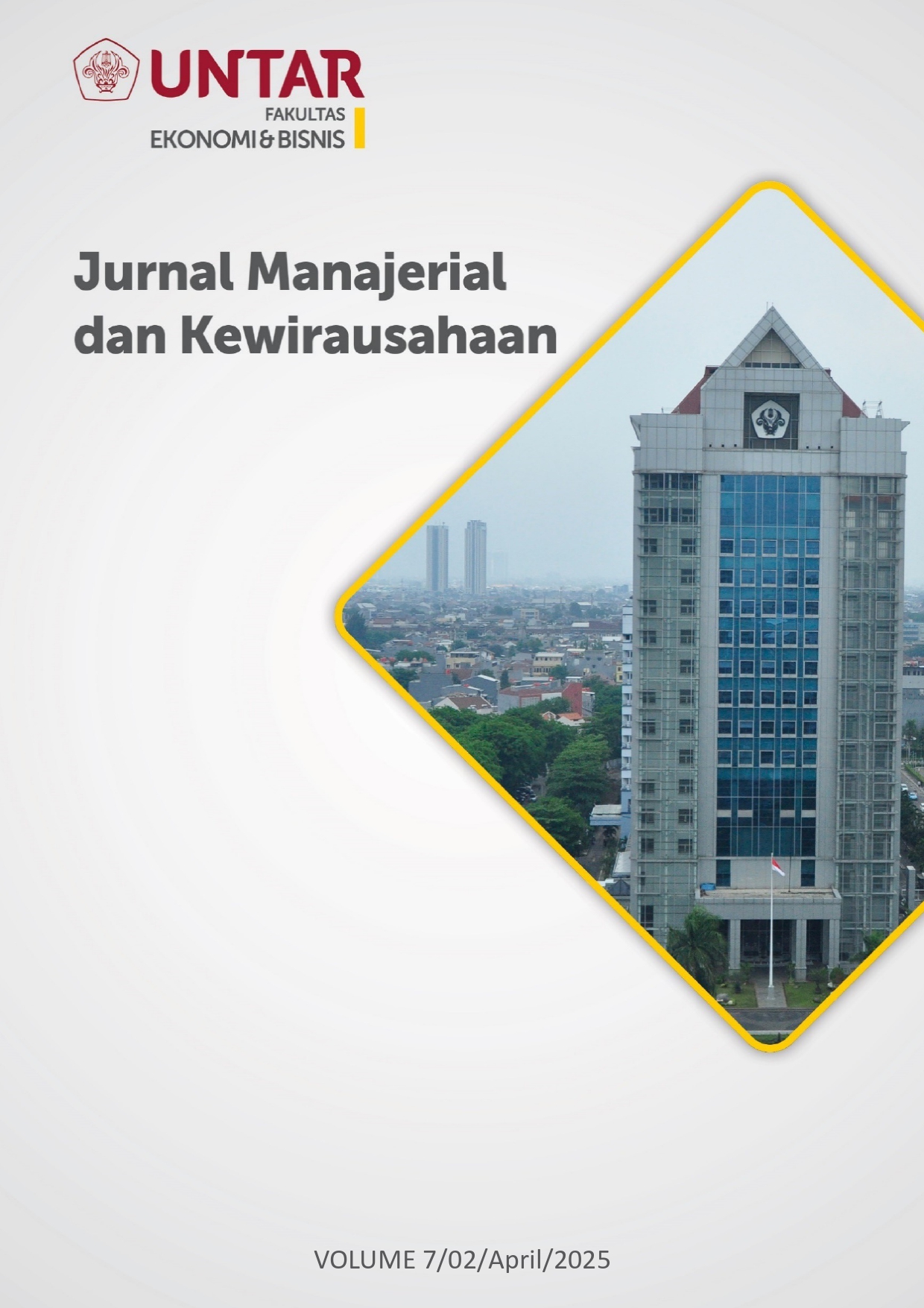Kontribusi Pendidikan Kewirausahaan, Keberanian Mengambil Risiko, dan Inovasi terhadap Intensi Berwirausaha Mahasiswa Tangerang
Main Article Content
Abstract
The high unemployment rate demands the younger generation to develop entrepreneurial intentions as a solution to creating job opportunities. With the courage to take risks and innovate, they can establish businesses that contribute to the economy. Entrepreneurial education plays a key role in equipping them with the necessary skills and mindset. The purpose of this study is to examine the influence of innovation, risk-taking, and entrepreneurial education on students' entrepreneurial intentions. Data were collected through questionnaires distributed both offline and online using non-probability sampling and purposive sampling techniques. The population for this study consists of university students in Tangerang. The data were analyzed using SEM-PLS with the SmartPLS 4.0 software. The results of the study indicate that: a) innovation positively influences students' entrepreneurial intentions; b) risk-taking positively influences students' entrepreneurial intentions; c) entrepreneurial education positively influences students' entrepreneurial intentions.
Article Details
Section

This work is licensed under a Creative Commons Attribution-NonCommercial-ShareAlike 4.0 International License.
This work is licensed under a Jurnal Muara Ilmu Ekonomi dan Bisnis Creative Commons Attribution-ShareAlike 4.0 International License.,/p>
References
Ahmed, T., Chandran, V. G. R., Klobas, J. E., Liñán, F., & Kokkalis, P. (2020). Entrepreneurship education programmes: how learning, inspiration and resources affect intentions for new venture creation in a developing economy. International Journal of Management Education, 18(1), 100327. https://doi.org/10.1016/j.ijme.2019.100 327
Atmono. D., Setiawan, A., & Rahmattulah, M. (2023). The effect of risk propensity, entrepreneurial intention and entrepreneurial self-efficacy on students’ entrepreneurial behavior. Dinamika Pendidikan, 18(2), 193-205. https://doi.org/10.15294/dp.v18i2.47443
Badan Pusat Statistik (BPS). (2024). Persentase penduduk miskin Maret 2024 turun menjadi 9,03 persen. https://www.bps.go.id/id/pressrelease/2024/07/01/2370/persentase-penduduk-miskin-maret-2024-turun-menjadi-9-03-persen-.html
Chai, M., & Soelaiman, L. (2024). Entrepreneurial Intentions and readiness for startup among P2MW grant recipients. Jurnal Ekonomi, 29(2), 185-201. http://dx.doi.org/10.24912/je.v29i2.2107
Fajri, K. A., Larasati, D., & Alifkah, P. S. (2022). Analisis Kebijakan Penanggulangan Kemiskinan Melalui Program Keluarga Harapan. Jurnal Manajemen dan Kebijakan Publik, 7(1), 158-170. https://doi.org/10.14710/gp.7.1.2022.158-170.
Gunawan, F. E., & Puspitowati, I. (2019). Pengaruh self efficacy dan risk taking terhadap intensi berwirausaha mahasiswa Universitas Tarumanagara. Jurnal Manajerial dan Kewirausahaan, 1(3), 438-446. https://doi.org/10.24912/jmk.v1i3.5354
Hair, J. F., Hult, G. T. M., Ringle, C. M., & Sarstedt, M. (2017). A primer on partial least squares structural equation modeling (PLS-SEM) (2nd ed.). Thousand Oaks, CA: SAGE Publications.
Hair, J. F., Ringle, C. M., & Sarstedt, M. (2011). PLS-SEM: Indeed a silver bullet. Journal of Marketing Theory and Practice, 19(2), 139–151. https://doi.org/10.2753/MTP1069-6679190202
Hair, J. F., Sarstedt, M., Hopkins, L., & Kuppelwieser, V. G. (2014). Partial least squares structural equation modeling: An emerging tool in business research. European Business Review, 26(2), 107–121. https://doi.org/10.1108/EBR-10-2013-0128
Iglesias-Sánchez, P. P., JambrinoMaldonado, C., Velasco, A. P., & Kokash, H. (2016). Impact of entrepreneurship programmes on university students. Education and Training, 58(2), 209–228. https://doi.org/10.1108/ET-01-2015- 0004
Indahsari, L., & Puspitowati, I. (2021). Pengaruh pendidikan kewirausahaan dan efikasi diri terhadap intensi wirausaha mahasiswa Universitas Tarumanagara. Jurnal Manajerial dan Kewirausahaan, 3(1), 267-276. https://doi.org/10.24912/jmk.v3i1.1132
Luc, P.T. The influence of personality traits on social entrepreneurial intention among owners of civil society organisations in Vietnam. International Journal of Entrepreneurship and Small Business, 40(3).https://doi.org/10.1504/IJESB.2020.107799
Minah, M. T., & Soelaiman, L. (2024) Peran pendidikan kewirausahaan dalam membangun jiwa wirausaha generasi z melalui efikasi diri dan pola pikir entrepreneurial. Jurnal Muara Ilmu Ekonomi dan Bisnis, 8(1), 63-74. https://doi.org/10.24912/jmieb.v8i1.28703
Nabi, G., Walmsley, A., Liñán, F., Akhtar, I., & Neame, C. (2016). Does entrepreneurship education in the first year of higher education develop entrepreneurial intentions? The role of learning and inspiration. Studies in Higher Education, 43(3), 452–467. https://doi.org/10.1080/03075079.2016. 1177716
Nathashia, & Rohiah (2020). Pengaruh inovasi, kepercayaan diri dan pengambilan risiko terhadap intensi berwirausaha pada mahasiswa Universitas Tarumanagara. Jurnal Manajerial dan Kewirausahaan, 2(1), 12-21. https://doi.org/10.24912/jmk.v2i1.7419
Nursito, S., Hadi, A., & Santoso, I. (2021). Pengaruh Efikasi Diri dan Pendidikan Kewirausahaan terhadap Intensi Kewirausahaan Mahasiswa. Jurnal Inspirasi Bisnis dan Manajemen, 5(1), 27-40. https://doi.org/10.33603/jibm.v5i1.4861
Peterman, N. E., & Kennedy, J. (2003). Enterprise education: influencing students’ perceptions of entrepreneurship. Entrepreneurship Theory and Practice, 28(2), 129–144.https://doi.org/10.1046/j.1540-6520.2003.00035.x
Rahmadi, N. A, & Heryanto, B. (2017). Analisis Faktor-Faktor yang Mempengaruhi Minat Berwirausaha Pada Mahasiswa Program Studi Manajemen Fakultas Ekonomi Universitas Kadiri. Jurnal Ekonomi Universitas Kadiri, 1(2), 153-169 https://doi.org/10.30737/ekonika.v1i2.13
Sekaran, U., & Bougie, R. (2016). Research methods for business: A skill-building approach (7th ed.). Hoboken, NJ: John Wiley & Sons Ltd.
Sekliuckiene, J., & Kisielius, E. (2015). Development of social entrepreneurship initiatives: A theoretical framework. Procedia - Social and Behavioral Sciences, 213, 1015–1019. https://doi.org/10.1016/j.sbspro.2015.11.519
Stel, A., Carree, M. & Thurik, A. R. (2005), “The effect of entrepreneurial activity on national economic growth”, Small Business Economics,24(3),311-321. https://doi.org/10.1007/s11187-005-1996-6
Stelmach, G. E., & Vroon, P. A. (1994). The psychology of risk taking behaviour. Advances in Psychology.
Tu, B., Bhowmik, R., Hasan M. K., Asheq, A. A., Rahaman, M. A., & Chen X. (2021). Graduate Students’ Behavioral Intention towards Social Entrepreneurship: Role of Social Vision, Innovativeness, Social Proactiveness, and Risk Taking, Sustainability 13(11), 1-23. https://doi.org/10.3390/su13116386
Tung, L. C. (2016). The impact of entrepreneurship education on entrepreneurial intention of engineering students. Polish Journal of Management Studies, 14(1), 119–128.
Weerakoon, C., McMurray, A. J., Rametse, N. M., & Arenius, P. M. (2020). Social capital and innovativeness of social enterprises: Opportunity-motivation-ability and knowledge creation as mediators. Knowledge Management Research & Practice, 18, 147–161.https://doi.org/10.1080/14778238.2019.1590138
Westhead, P., & Solesvik, M. Z. (2016). Entrepreneurship education and entrepreneurial intention: Do female students benefit? International Small Business Journal: Researching Entrepreneurship, 34(8), 979–1003. https://doi.org/10.1177/0266242615612 534
Wibowo, & Agus. (2011). Pendidikan kewirausahaan: Konsep dan strategi. Yogyakarta: Pusaka Pelajar.
Wibowo, A. C., & Suasana, I. G. A. K. G. (2017). Pengaruh Efikasi Diri, Pengambilan Risiko, Dan Inovasi Terhadap Niat Berwirausaha Mahasiswa FEB Universitas Udayana. E-Jurnal Manajemen Unud, 6(10), 5694–5695.
Zuckerman, M., & Kuhlman, D. (2000). Personality and Risk Taking: Common Biosocial Factor. Journal of Personality, 68(6).https://doi.org/10.1111/1467-6494.00124

